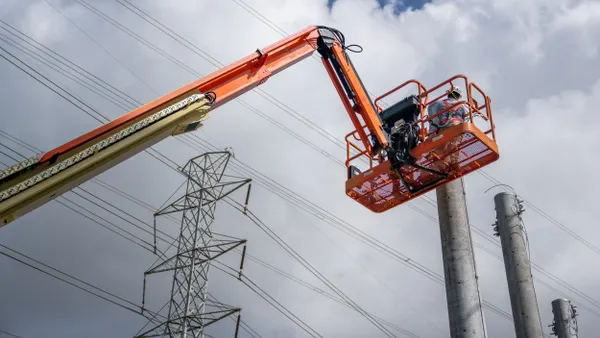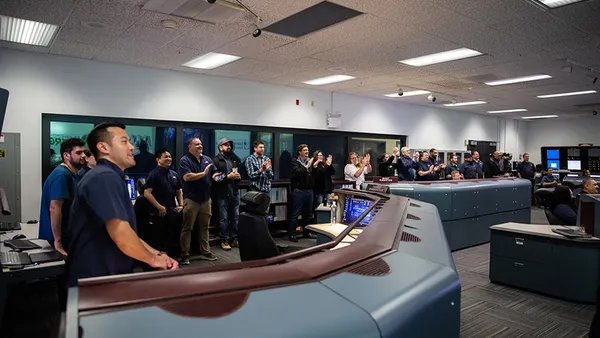Dive Brief:
- Eighteen trade associations representing utilities, power plant developers and electrical equipment manufacturers on Friday urged Senate leaders to preserve a more lenient standard for energy projects to qualify for the technology-neutral clean energy investment and production tax credits in the Republican budget bill.
- Reverting from the “start of construction” standard in the current Senate Finance Committee text to the more restrictive “placed in service” standard in the version the House passed last month would “upend investment expectations, introduce substantial business uncertainty, harm electricity customers, and risk delaying or even canceling critical U.S. energy infrastructure projects already underway,” the letter said.
- The Senate Finance Committee text still sets a high bar for wind and solar generation, restricting full credit eligibility to projects that start construction by the end of this year and dropping credit values to 60% and 20% for projects that break ground in 2026 and 2027, respectively. Nuclear, geothermal and other clean energy technology developers can earn credits on projects that break ground well into the 2030s.
Dive Insight:
With Congressional Republicans facing a self-imposed July 4 deadline to send the budget bill to President Trump, the Senate could vote as soon as Friday on its version of the package. If it passes, House and Senate negotiators would then hash out a compromise bill for both chambers to vote on.
Provisions pertaining to the technology-neutral clean energy tax credits the Inflation Reduction Act authorized in 2022 could change at any point during the process.
Current policy allows wind, solar and other clean energy technologies to qualify for the full investment or production tax credits — generally 30% of the total qualifying project value — through 2032. The House budget bill would begin phasing out credit eligibility for projects placed in service next year and eliminate it completely in 2028, while the Senate Finance Committee text preserves some eligibility for projects that begin construction by 2028.
Both the House and Senate versions cleave wind and solar from energy storage and “clean firm” power generation technologies like nuclear, geothermal and hydropower. The clean firm technologies get a significantly longer runway in the Senate version, which extends the full ITC and PTC — generally 30% of the total qualifying project value — to projects that begin construction by 2033. The credit value steps down in 2034 and 2035 and goes away entirely in 2036.
The Senate version also maintains tax credit transferability for the credits’ entire lifespan, a significant change from the House’s rapid phaseout, and one that advocates say is crucial for many projects to pencil out.
Although the Senate’s version did not cut as deeply into utility-scale wind and solar, it retains the House bill’s unfavorable treatment of rooftop solar. Separate credits for purchased and leased rooftop solar systems sunset at the end of this year, which could raise costs for homeowners who purchase solar systems as well as third-party lessors like Sunrun. Shares of publicly traded companies exposed to the rooftop solar industry, including Sunrun and Enphase, have seen dramatic declines since the House released its first version of the bill in mid-May.
The energy groups’ letter does not address these issues and focuses only on the “start of construction” provision, which largely affects utility-scale projects. They say the Senate’s more generous timeline provides certainty and stable economics for clean energy projects in construction or advanced development.
The June 20 letter noted that the permitting process and long lead times for key components and equipment can add years to projects’ estimated completion timelines, potentially rendering projects ineligible for credits due to forces beyond their control.
“The start of construction standard accommodates these realities by recognizing when an electricity provider has made a substantial investment and commenced physical activity,” the letter said.
Those arguments echo recent comments from representatives of major utilities and independent power providers. In a Fortune editorial this week, NextEra CEO John Ketchum said the “start of construction” language is crucial to meet near-term load growth amid yearslong backlogs for gas turbines and high-voltage electrical equipment.
“Practical, commonsense provisions, like tying credits to the start of construction as they are phased out, provide a runway to finish projects and put much-needed electrons onto the grid while keeping power prices low for American homes and businesses,” Ketchum said.
The June 20 letter also noted the “start of construction” standard’s importance for projects’ bankability by making it easier for sponsors to secure offtake agreements, financing and equipment orders.
By contrast, a “placed in service” standard “would inject unacceptable timing risk into transactions, particularly for large-scale or multi-phase projects where construction may take several years and could chill ongoing investment,” the letter said.
The letter’s signatories included groups representing utilities and other electric power providers that serve most Americans, including the American Public Power Association, Edison Electric Institute, Electric Power Supply Association, Large Public Power Council and National Rural Electric Cooperative Association.
They also include groups representing the clean energy industry, such as the American Clean Power Association, Advanced Energy United and Solar Energy Industries Association.
Its tone contrasts with comments these groups have made in other venues, where they warned against substantial changes to the current tax credit structure. On June 16, for example, ACP CEO Jason Grumet issued a statement saying the Senate Finance Committee text would increase electricity costs and threaten hundreds of thousands of jobs.
“While the Senate Finance Committee proposal eliminates poison pills from the House legislation, abrupt changes to the clean energy tax credits unnecessarily penalize companies that are making good faith investments under current law,” Grumet said.















